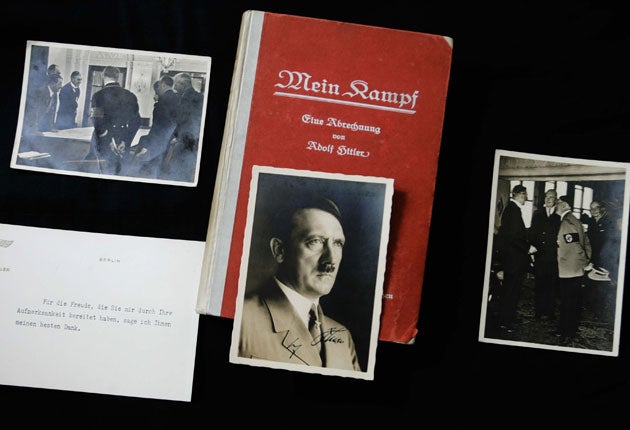German Jews want 'Mein Kampf' reprinted
Country divided by call to republish Hitler's anti-semitic autobiography

Your support helps us to tell the story
From reproductive rights to climate change to Big Tech, The Independent is on the ground when the story is developing. Whether it's investigating the financials of Elon Musk's pro-Trump PAC or producing our latest documentary, 'The A Word', which shines a light on the American women fighting for reproductive rights, we know how important it is to parse out the facts from the messaging.
At such a critical moment in US history, we need reporters on the ground. Your donation allows us to keep sending journalists to speak to both sides of the story.
The Independent is trusted by Americans across the entire political spectrum. And unlike many other quality news outlets, we choose not to lock Americans out of our reporting and analysis with paywalls. We believe quality journalism should be available to everyone, paid for by those who can afford it.
Your support makes all the difference.Germany's Central Council of Jews has taken the unprecedented step of backing a proposal to republish Adolf Hitler's infamous autobiographical manifesto Mein Kampf, which has been strictly outlawed in the country since the end of the Second World War.
Although many German Jews still oppose reissuing Hitler's anti-Semitic work, Stephan Kramer, the general secretary of the country's leading Jewish organisation, supports a new scholarly edition of the work designed to inform future generations of the evils of Nazism.
"It makes sense and is important to publish an edition of Mein Kampf with an academic commentary," Mr Kramer said. "A historically critical edition needs to be prepared today to prevent neo-Nazis profiting from it."
However the southern state of Bavaria, which holds the rights to the book, remains strongly opposed to the idea. "We won't lift the ban as it may play straight into the hands of the far right," said a spokesman for the Bavarian government. "Prohibition is highly regarded by Jewish groups and we mean to keep it that way," he said.
Several German academics, including the historian Jürgen Faulenbach, also oppose republishing the work and insist that it does little to throw light on the Nazi era. "The book does not provide any important answers to questions about how the Nazi regime was possible," he said. "It only contains the polarising views of the author. To lift a 60 year old ban on Mein Kampf would be problematic."
Hitler wrote Mein Kampf, which means "My Struggle", in 1924 while serving a four-year term in a Bavarian prison. The book contains the Nazi leader's well-known views on racial purity, and demonstrates his hatred of communism and the Jews. It also hints at his long term plans for the Holocaust.
During the Third Reich, the book became a household item, although few Germans managed to get through all of its turgid prose. The book was outlawed in 1945 and although it has been republished abroad several times, Bavaria has insisted that the ban be upheld in Germany ever since.
However, Bavaria's rights over the book are due to expire in 2015 and the courts have yet to determine whether German laws banning the distribution of Nazi propaganda will continue to prevent the book from ever appearing in the country.
In an attempt to forestall any new legal ban on the book after 2015, Munich's Institute for Contemporary History applied this week for permission to reprint the work after that date. It aims to produce an edition containing scholarly footnotes challenging most of Hitler's assertions. "A scientific edition would help to dispel the peculiar myths surrounding this book," said Horst Möller, the institute's director.
The idea has also received firm backing from the British historian and acclaimed Hitler biographer Sir Ian Kershaw. "A grown up democracy like Germany does not need to fear that Hitler's damaging treatise would somehow constitute a threat to society," he said in an interview with Germany's Stern magazine. He pointed out that the internet meant that attempts to ban Mein Kampf were a waste of time.
The internet is also one of the reasons for the new stance taken by Germany's Central Council of Jews: "It is all the more important that young people should see the critical version when they click on to Mein Kampf on the web," Mr Kramer said.
Join our commenting forum
Join thought-provoking conversations, follow other Independent readers and see their replies
Comments